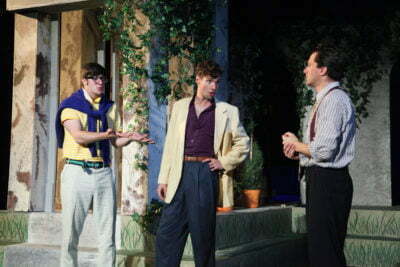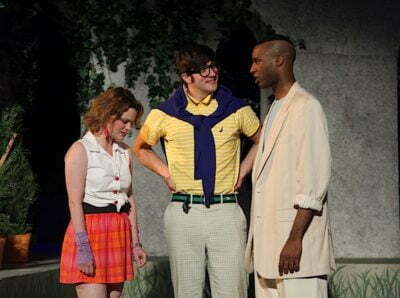The Two Gentlemen of Verona
Directed by Lavina Jadhwani
Produced by Oak Park Festival Theatre
A Young Shakespearean Attempt at Comedy
If you are a theatre company dedicated to performing the works of Shakespeare, you have the blessing of about a dozen high-quality plays with large fanbases to select from. And if your theatre company was founded in 1975, you will have cycled through those plays a few times by now. At which point, you end up doing The Two Gentlemen of Verona. Director Lavina Jadhwani writes that this seldom-produced play was probably Shakespeare’s earliest, or at least, his earliest comedy, and is “definitely problematic.” She may have been referring to how amoral one of the lead characters is, but could have also meant that Shakespeare was only beginning to use devices like cross-dressing, false death reports, and clowns, and hadn’t mastered them yet. In any case, nominally setting it in the 1980s in order to play pop music during intermission and make costuming easier doesn’t alleviate the common misgivings about this work.

Our two gentlemen, Valentine (Michael Pogue), and Proteus (David Keohane), are good friends, but reaching the age where young people have to strike out on their own. Valentine’s father sends him to Milan to be a courtier, while Proteus stays to woo the woman he loves, Julia (Vahishta Vafadari). She is forbidden from openly returning his love due to the prudery of the times, but dearly hopes for a future with him. Her hopes are dashed, however, when Proteus’s father (Jack Hickey) decides to send him to Milan, as well. There, Valentine is in love with the Duke’s daughter, Silvia (Sigrid Sutter), who is betrothed to someone she does not care for. But when Proteus arrives, he becomes obsessed with Silvia as well, and resolves to double-cross both his best friend and the Duke in order to have her. Poor Julia is pursuing him, dressed as a boy, and winds up delivering Proteus’s love letters to her unwitting rival.

Before the play turns dramatic, we have to put up with a lot of Shakespearean clown banter that riffs on words and practices that no longer exist, except this time, it relies on characters not understanding quite plain sentences. During these scenes, the actors make contorted faces, speak in strained inflections, and make slap-sticky motions to let us know they are being funny. They improve a lot during their more serious scenes later on, when they don’t have to pretend to be bonding with each other through wordplay, or signal to the audience that we are supposed to be feeling something other than we are. I noticed that they were much more believable during monologs than when interacting with each other, when most of their reactions seemed forced and pre-planned. I did enjoy Tim Martin in the unrewarding role of Thurio, Silvia’s unwanted betrothed. He moves elegantly, and has a natural-sounding haughty delivery. David Keohane is a sneering, grimacing Proteus, who with his condescending grins, reminds me more of a Don John from Much Ado About Nothing or Sebastian from The Tempest than a young lover. Noah Laufer appears as the forlorn clown Launce, accompanied by a very sedate dog, who is cute, at least.
The play is supposedly a bromance, according to the program, but that’s a problem because Valentine and Proteus don’t seem to actually like each other all that much, or really, anybody else. Lavina Jadhwani is an experienced director, so I have to think this is an odd misfire for her. The end of the play works better than what has proceeded it, as Proteus’s emotions seem genuine, but the actors can’t quite seem to either embrace the script, or break out of it. For those who are curious about Shakespeare’s more obscure work, this is a chance to see a rarely produced play. I’ve never quite understood the appeal of the cross-dressing in Twelfth Night, but since that’s in this as well, fans of Shakespearean comedy may find some of what they like. Maybe Jadhwani tried taking the story too seriously, or maybe it’s just not funny, but if prospective audience members approach it as a drama, they may find it more successful.
Somewhat Recommended
Jacob Davis
[email protected]
Reviewed July 26, 2015
For more information, see The Two Gentlemen of Verona’s page on Theatre in Chicago.
Playing outdoors at Austin Gardens, 167, Forest Avenue, Oak Park, Illinois. Tickets are $27, with discounts for seniors and students, and free for children under twelve; to order, call 708-445-4440 or visit oakparkfestival.com. Performances are Thursdays-Saturdays at 8:00 pm and Sundays at 7:00 pm through August 22, as well as August 19 at 7:00 pm Running time is two and a half hours with one intermission.

